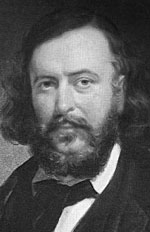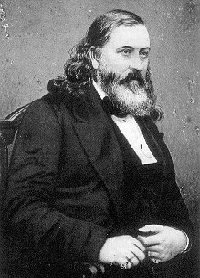Albert Pike
Albert Pike was born in Boston, Massachusetts on December 29, 1809. He was educated in Newburyport, where his parents moved while he was young.
He claimed to have attended Harvard, but no record of this exists. Six feet tall, weighing 300 pounds, with waist-length hair, Pike was an imposing figure. While he may have been self-taught beyond his high school years, he could converse in Sanskrit, Hebrew, Greek, Latin, and French.
He taught in various Massachusetts schools until 1831, when he moved to Independence, Missouri.
He joined a group of hunters and traders headed for New Mexico, then Texas.
 In 1833, he was teaching school again, this time in Arkansas. He became a poet, newspaper publisher, planter, and lawyer. As a lawyer, he specialized in claims on behalf of Native Americans against the federal government. In 1833, he was teaching school again, this time in Arkansas. He became a poet, newspaper publisher, planter, and lawyer. As a lawyer, he specialized in claims on behalf of Native Americans against the federal government.
As a Whig, Pike was opposed to secession from the Union, but accepted it when the state of Arkansas voted to secede.
Pike was asked to act as an envoy to the Native American population, as he had established good ties with the Cherokee Nation while helping to negotiate a treaty favorable to the Cherokees. Appointed Brig. General, Pike trained three Confederate regiments of Native Americans.
His Native American troops fought well at the Battle of Pea Ridge, but were later routed during a Union counterattack. Unable to reassemble his troops, he was blamed for contributing to the Confederate defeat, charges that were made worse when the Union claimed that wounded and dead soldiers had been scalped on the field.
His difficulties worsened further when he exchanged charges of corruption with Major General Thomas Hindman, who ordered Pike arrested. Pike escaped into the hills of Arkansas, eluding a court martial. His resignation was accepted on November 11, 1862.
 After the end of the American Civil War, Pike abandoned his wife in Arkansas, roaming the east and midwest, at various times practicing law, writing poetry, and editing a newspaper, much as he had done before the war. After the end of the American Civil War, Pike abandoned his wife in Arkansas, roaming the east and midwest, at various times practicing law, writing poetry, and editing a newspaper, much as he had done before the war.
There are claims that he developed the rituals of the Ku Klux Klan for Nathan Bedford Forest.
He did write the rituals of Freemasonry, and became Grand Commander of the Scottish Rite Masons, and a national spokesman for Freemasonry.
Albert Pike died in the District of Columbia on April 2, 1891.
|

